7 Proven Home Remedies for Glowing Skin
1. Aloe Vera – Nature’s Instant Hydrator
- How Aloe Vera Soothes and Nourishes the Skin
- with generations, aloe vera has been referred to as the “plant of immortality,” and with good reason. A transparent gel that is high in vitamins, minerals, amino acids, and antioxidants is stored in its thick, succulent leaves.
- Home Remedies for Glowing Skin Aloe vera is one of the most dependable natural hydrators for all skin types, according to dermatologists and Ayurvedic practitioners.
- Aloe vera is special because of its high water content; about 98% of it is made up of natural, clean water that has been enhanced with enzymes and polysaccharides to retain moisture without causing oiliness on the skin.
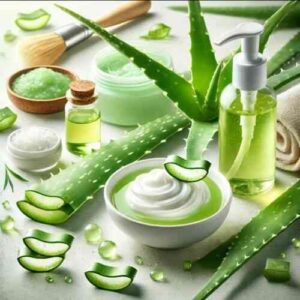
- According to experts, aloe vera is prized for its ability to soothe the skin. Acemannan and glucomannan, two substances found in the plant, aid in repairing the skin’s protective layer and promote quicker healing of dryness, irritation, and microtears.
- Aloe vera’s anti-inflammatory qualities have been demonstrated in scientific research to lessen redness, heal sunburns, and soothe skin prone to acne.
- Aloe is one of the safest natural hydrators for people with sensitive skin since it hydrates while lowering irritation.
- In my experience, when people use fresh aloe gel, they frequently perceive an instant cooling impact.
- Because it provides immediate comfort, it’s a popular treatment for sunburn, shaving, and other skin heat-related issues.
- Aloe vera penetrates rapidly into the skin, leaving it plump and invigorated without leaving any sticky residue, in contrast to thick creams.
- Many users also mention how consistent use enhances the skin’s natural radiance, giving it a more youthful, supple appearance.
- Aloe vera also contains micronutrients that nurture the skin. It contains vitamins A, C, and E, which are potent antioxidants that prevent damage from free radicals and delay the onset of aging.
- Natural sugars aid in restoring suppleness, and the presence of zinc and magnesium promotes skin regeneration even more.
- Best Ways to Apply Fresh Aloe Gel for Glow
- Aloe vera’s adaptability is what makes it so beautiful. The purest and most efficient way is to use fresh aloe gel straight from the plant.
- Just cut a leaf, scoop out the clear gel, and spread it evenly over skin that has been washed.
- Leaving it on for 15–20 minutes before rinsing helps the skin absorb its hydration and nutrients, leaving behind a soft, dewy finish.
- You can apply a small coating of aloe gel to your face and allow it to penetrate like a moisturizer for daily hydration.
- Because aloe gel hydrates without blocking pores, those with oily or acne-prone skin frequently choose it over thick lotions.
- It can even be applied as a natural primer to smooth the texture of the face under makeup.
- Aloe vera combined with other natural substances is another well-liked technique. Add a few drops of honey or rose water to fresh aloe gel to create a glow-boosting mask.
- This intensifies its brightening and moisturizing properties. Aloe gel and a small teaspoon of turmeric can be used to make a calming, glow-enhancing pack for people with dull skin.
- Overnight care is another area in which aloe vera excels.
- A little layer applied before bed helps keep moisture in while you sleep, enabling your skin to heal itself. Your skin feels renewed and glowing in the morning.
- This is a natural substitute for night lotions that include chemicals, and many beauty enthusiasts swear by it.
- From the standpoint of trust, it’s important to remember that while patch testing is always advised, fresh aloe gel is often safe for the majority of skin types.
- It’s crucial to make sure you just scoop the clear gel because some people may be sensitive to aloe latex, which is the yellowish sap behind the leaf skin.
- In the end, aloe vera is a dermatologist-recommended ingredient for healthy, radiant skin, not merely a DIY cure.
- It is still one of nature’s most straightforward yet potent gifts for moisture and brightness, whether it is used raw, in a mask, or added to skincare products.
2 Turmeric & Milk – The Golden Glow Duo
- Why Turmeric is a Natural Brightener
- Turmeric has long been regarded as the best skin-brightening ingredient in Ayurveda and conventional beauty practices.
- Turmeric, also referred to as the “golden spice,” has anti-inflammatory, antioxidant, and skin-rejuvenating properties due to a potent bioactive component called curcumin.
- Turmeric is one of nature’s best ways to restore natural brightness, from lowering pigmentation to balancing your skin tone.
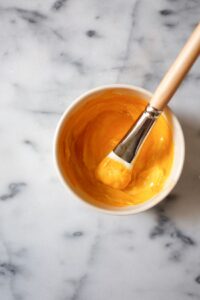
- According to experts, turmeric’s capacity to lessen excessive melanin formation is what gives it its skin-brightening qualities.
- Overactive melanocytes and oxidative stress are common causes of dullness, dark patches, and hyperpigmentation.
- This is directly addressed by curcumin, which calms hyperactive skin cells and neutralizes free radicals.
- Turmeric’s ability to lessen pigmentation and enhance complexion is supported by studies that have been published in dermatology journals.
- From an experiential perspective, turmeric’s glow-giving properties are highlighted in numerous beauty traditions, ranging from contemporary DIY skincare to Indian bridal rites like “haldi ceremonies.” After just one application, users of turmeric-based masks frequently report feeling instantly brighter and more toned.
- Turmeric is a safe long-term glow remedy since it works gradually but gently, unlike harsh chemical peels or bleaching treatments.
- Home Remedies for Glowing Skin Turmeric is special because it has two functions: it reduces inflammation and lightens imperfections.
- Turmeric reduces redness, edema, and post-acne marks in those with acne-prone skin.
- Its antimicrobial qualities fight microorganisms that cause acne, guaranteeing cleaner and more radiant skin.
- Lactic acid, a naturally occurring alpha-hydroxy acid (AHA) that gently exfoliates dead skin cells, is a wonderful compliment to turmeric.
- This unclogs pores, smoothes the skin, and improves the absorption of turmeric’s nutrients.
- Turmeric and milk work together to create a natural combination that moisturizes, brightens, and revitalizes skin without causing severe irritation.
DIY Turmeric Face Mask Recipe for Radiant Skin
- Making a turmeric face mask at home is easy, inexpensive, and very successful. This formula, which combines the benefits of milk and turmeric for optimum radiance, has been authorized by dermatologists:
- Ingredients: One teaspoon of organic turmeric powder (to prevent discoloration, use wild turmeric, also called kasturi manjal)
- Two teaspoons of raw milk (for mild exfoliation and hydration)
- One teaspoon of optional honey, which adds moisture and has antimicrobial properties
- Method: In a clean bowl, combine milk and turmeric powder and stir until a smooth paste develops.
- If you want more moisture and nutrients, add honey.
- Avoid the region around your eyes and apply the paste evenly across your cleansed face.
- Rinse with lukewarm water after leaving it on for ten to fifteen minutes.
- To seal in hydration, apply a little moisturizer afterward.
- From an experience perspective, using this mask on a regular basis (about two to three times per week) helps to enhance skin texture, eliminate dark spots, and bring back a natural glow. After only a few weeks of regular use, many people say their skin feels smoother, looks noticeably brighter, and seems healthier.
- To make it more effective, you can customize this mask based on your skin needs:
- Add a small amount of sandalwood powder on oily skin to help manage it.
- For further nourishment, use fresh cream instead of milk on dry skin.
- Add a few drops of tea tree oil for extra antibacterial strength if your skin is prone to acne.
- Always make sure the turmeric you use is pure and devoid of artificial coloring for reasons of safety and trust.
- Commercial cooking-grade turmeric powders can include ingredients that might cause skin irritation.
- Using cosmetic-grade, organic turmeric guarantees greater results and lowers the possibility of discoloration.
- Milk and turmeric combined can become a classic skincare routine when applied carefully.
- In addition to treating pigmentation and dullness, this golden glow duo also nourishes the skin from the inside out, providing you with brightness that lasts for a long time in the most natural way.
3. Honey – The Natural Moisturizer
- How Honey Locks in Hydration
- For thousands of years, honey has been valued for its culinary and cosmetic properties. It was thought that Cleopatra and other ancient Egyptian queens bathed in milk and honey to keep their skin looking young and radiant.
- Because honey has special humectant qualities, which allow it to absorb moisture from the air and retain it in the skin, modern dermatology also supports honey’s usage as a natural moisturizer.
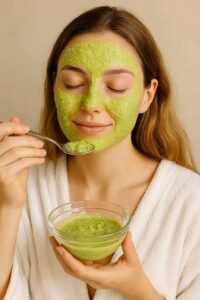
- According to experts, honey’s inherent sugars (such as fructose and glucose) link water molecules to form a barrier that keeps moisture from escaping.
- Honey hydrates the skin more deeply than petroleum-based moisturizers because it penetrates the top layers of the skin.
- Additionally, it has antioxidants, amino acids, and trace levels of enzymes that support and strengthen the skin barrier, increasing its resistance to environmental deterioration and dryness.
- Honey’s antibacterial properties offer yet another unique benefit. Raw honey, especially Manuka honey, contains hydrogen peroxide and methylglyoxal, which fight acne-causing bacteria.
- This suggests that honey not only hydrates skin but also keeps it clear and healthy. This rare natural component balances healing and moisture, making it beneficial for both dry and acne-prone skin types.
- Dermatologists stress that, even though raw, unfiltered honey is generally safe for most people, it is always better to utilize it for skincare from a trust perspective.
- Preservatives or other sugars that don’t have the same health advantages are commonly found in commercial honey. A patch test is also recommended for people with severely sensitive skin.
- Simple Honey Face Pack for Soft, Glowing Skin
- One of the easiest ways to enjoy honey’s benefits is through a quick and effective DIY face pack. Here’s a simple recipe that works for all skin types:
- Ingredients:One tablespoon of unprocessed honey
- One teaspoon of yogurt, if desired, for a gentle exfoliation
- A few optional drops of rose water for a calming impact
- Method:To make a smooth paste, combine honey, yogurt, and rose water.
- After washing your face and neck, evenly apply.
- For 15 to 20 minutes, leave it on.
- After rinsing with warm water, pat dry.
- If necessary, use your usual moisturizer afterward.
- One of the easiest ways to enjoy honey’s benefits is through a quick and effective DIY face pack. Here’s a simple recipe that works for all skin types:
- In terms of experience, this mask leaves the skin feeling moisturized, smooth, and glowing right away. Lactic acid in yogurt gently exfoliates dead skin cells, and honey retains moisture, giving the skin a smoother, more radiant appearance.
- Pure honey by itself can also be used as a fast mask; just apply a little layer to your face, let it sit for ten minutes, and then rinse. Since the skin tends to get extremely dry in the winter, this is especially beneficial. Honey and a pinch of turmeric can be combined to improve healing and brighten the skin for people with acne scars.
- Honey is safe enough to use on a daily or weekly basis from a trust and safety standpoint, but steer clear of commercial varieties that are too sticky or sweetened. Organic, raw honey guarantees efficacy and purity.
- In the end, honey is more than just a delicious treat; it is nature’s own moisturizer, hydrating, healing, and brightening the skin. For this reason, it is an essential component of any natural skincare regimen.
4. Rose Water – A Refreshing Skin Toner
- Cooling and Balancing Benefits of Rose Water
- Rose water, sometimes referred to as the “queen of all tonics,” has long been hailed as a natural beauty booster.
- It is made by steam distilling rose petals, which retains the vital chemicals and natural antioxidants of the flower.
- Rose water is a favorite for all skin types, especially sensitive and acne-prone skin, because it is mild yet effective in contrast to chemical-laden toners.
- According to experts, rose water’s greatest significance lies in its capacity to return the skin’s natural pH equilibrium.
- The skin’s protective layer is frequently removed by cleaners and environmental conditions, making it susceptible to inflammation.
- Rose water keeps the skin robust and less reactive by balancing its slightly acidic pH. Its gentle astringent properties also aid in pore tightening, which makes the skin appear smoother and more sophisticated without making it dry.
- Additionally, rose water has a natural cooling action that reduces redness and irritation right away. It includes flavonoids and phenolic compounds – strong antioxidants that protect the skin from free radical damage caused by pollution and UV exposure.
- In terms of experience, the first thing people notice about rose water is how cool and pleasant it is. Both the skin and the mood are instantly lifted by a brief spritz after a long day or a light dab with cotton pads after cleansing.
- Its subtle floral scent adds another soothing impact, and aromatherapy frequently uses it to ease tension and encourage relaxation. Regular application over time makes the skin appear more balanced, moisturized, and brighter.
- Dermatologists concur that rose water, as long as it is pure and devoid of alcohol or artificial aroma, is generally safe to use on a daily basis.
- Ways to Use Rose Water Daily for Glow
- Rose water is one of the simplest natural ingredients to incorporate into a daily beauty routine because of its many uses. The following are some conventional and dermatologist-recommended techniques:
- As a Toner: Use a cotton pad or spray directly onto the skin to apply rose water after cleansing. It reduces pores, gets rid of impurities, and gets the skin ready for serum or moisturizer.
- Carry a spray bottle of rose water with you at all times so you can wet your face. Without removing makeup, this quickly revitalizes dry, tired skin and leaves it shining.
- For do-it-yourself face masks, combine rose water with aloe vera gel, sandalwood powder, or multani mitti (fuller’s earth). This enhances hydration and glow while improving skin texture.
- Cotton pads should be soaked in chilled rose water and placed over closed eyelids for ten minutes to create calming effects. This revitalizes weary eyes and lessens puffiness.
- Makeup Setting Spray: Applying rose water after applying makeup helps to seal in the goods and maintains the dewy, youthful appearance of the skin.
- For Hair & Scalp: Rose water can even be applied to the scalp to balance pH, lessen itching, and leave hair with a pleasant scent.
- Users frequently discover that using rose water twice a day, in the morning and the evening, helps them keep a natural glow. In hot, muggy areas when the skin need frequent cooling and hydration, it is quite beneficial.
- Rose water should always be kept in a cool, dark place or refrigerated to preserve freshness out of consideration for safety and trust. Real rose water rarely irritates skin and is safe to use for extended periods of time.
- Rose water is one of the simplest natural ingredients to incorporate into a daily beauty routine because of its many uses. The following are some conventional and dermatologist-recommended techniques:
5. Lemon & Yogurt – For Clear, Bright Skin
- Vitamin C Power of Lemon:
- Because of its high vitamin C concentration, lemon has long been used as a natural brightener and is frequently referred to as a “skin clarifier.” This necessary antioxidant is important for lowering pigmentation, increasing collagen synthesis, and shielding the skin from oxidative damage. Lemon’s citric acid also acts as a gentle exfoliant, assisting in the removal of dead skin cells that cause sagging.
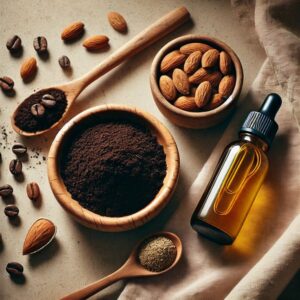
- According to experts, one of the most studied skincare substances for balancing and lightening skin tone is vitamin C. It lessens dark spots and hyperpigmentation by blocking the tyrosinase enzyme, which is in charge of producing melanin. When utilized properly, fresh lemon juice provides these advantages in a natural way.
- In my experience, a lot of individuals utilize lemon to lighten imperfections and revitalize their complexion. The skin might appear cleaner and more luminous with just a few drops combined with water or other calming chemicals. It’s crucial to remember that lemon juice by itself can be very acidic and hurt delicate skin. Therefore, combining it with a mild base, such as yogurt, guarantees its advantages without running the risk of becoming harsh.
- Dermatologists recommend using lemon sparingly and always diluted from a trust standpoint.
- Direct application of undiluted lemon juice to the skin may result in photosensitivity, dryness, or irritation. Therefore, it is safe and effective to use it in a well-balanced mix with yogurt.
- Yogurt’s Lactic Acid for Gentle Exfoliation
- Another traditional beauty element is yogurt, which is particularly well-liked due to its high lactic acid content. Lactic acid is a natural alpha-hydroxy acid (AHA) that gently exfoliates the skin by removing dead skin cells. Yogurt offers a gentle, skin-friendly exfoliation that leaves the skin feeling smooth and glowing, in contrast to abrasive scrubs that can result in microtears.
- According to dermatologists, lactic acid is frequently used to improve skin texture, lessen dullness, and promote cell renewal. Yogurt is the ideal complement to lemon’s brightening properties because it also contains probiotics, proteins, and lipids that nourish and hydrate the skin.
- Yogurt has an instant cooling and calming impact when applied to the face, according to experience. It revitalizes the skin by hydrating parched areas and lowering redness. Regular application of yogurt-based masks gradually enhances skin clarity, lessens roughness, and encourages a uniform glow.
- Yogurt is regarded as safe for the majority of skin types, including sensitive skin, from the standpoint of trust. However, topical usage should be avoided by persons who are allergic to dairy. To avoid being irritated by sugars or additives, always use plain, unsweetened yogurt.
- Quick Lemon-Yogurt Glow Mask
- Combining lemon and yogurt creates a quick, effective glow mask that brightens and exfoliates naturally.
- Ingredients: One scoop of plain yogurt
- One teaspoon of freshly squeezed lemon juice
- For added hydration, one teaspoon of honey is optional.
- Method:Mix all the ingredients to form a homogeneous paste.
- Apply evenly after cleansing your face and neck.
- Let it sit for 10 to 12 minutes.
- Rinse with warm water, then pat dry.
- Apply sunscreen again later if you do it during the day.
- In terms of experience, this mask produces immediate results. Honey calms, yogurt gently exfoliates, and lemon adds brightness, leaving the skin smooth, clear, and radiant. It helps lighten dark spots, smooth out skin texture, and bring back a natural glow when used frequently (one to two times a week).
- From a trust and safety perspective, always undertake a patch test before applying lemon on the skin. Also, avoid sun exposure shortly after using lemon-based masks, since skin may be more sensitive. For protection, sunscreen must be applied thereafter.
6. Cucumber – The Cooling Cleanser
- How Cucumber Reduces Puffiness & Dullness
- For a long time, cucumber has been considered a “natural cooling agent” for the skin. Its nearly 96% water content makes it extremely hydrating, and its abundance of vitamins, minerals, and antioxidants helps revitalize and revitalize sagging skin. Cucumber slices are therefore a common ingredient in both home cures and spa treatments.

- According to experts, cucumbers have potent anti-inflammatory and antioxidant qualities because of their cucurbitacins, flavonoids, and vitamin C content.
- These lessen puffiness, soothe redness, and shield the skin from free radical-induced oxidative stress. For example, applying slices of cold cucumber to the eyelids decreases edema and constricts blood vessels, giving the area under the eyes a more relaxed and brighter appearance.
- Cucumber also fights boredom. Vitamin C enhances brightness, and its natural silica helps to produce collagen.
- Cucumber helps tighten pores and enhance skin texture without over-drying because it has a mild astringent effect. Because of its cooling and moisturizing properties, dermatologists frequently suggest cucumber as a mild skin soother for those with sensitive or inflamed skin.
- In terms of experience, using cucumber is immediately revitalizing. It leaves the skin feeling supple, full, and refreshed whether it is applied as a juice, mask, or even straight slices. Many people say that after applying cucumber regularly, their weary, lifeless skin seems more vibrant. In the summer, when skin is more susceptible to heat, oiliness, and exhaustion, it is very helpful.
- Cucumber is regarded as one of the safest natural skincare products when it comes to trust. It works well for almost all skin types, especially sensitive skin, and doesn’t cause irritation. Still, patch testing is always recommended for people with extremely reactive skin.
- Easy Cucumber Face Pack for Instant Freshness
- Because of its many uses, cucumber may be easily included to DIY face packs for cooling and quick shine. Here’s a quick and easy recipe:
- Ingredients:Half of a cucumber (peeled and pureed)
- One spoonful of hydrating aloe vera gel
- One teaspoon of optional rose water (for added freshness)
- Method: Make a smooth paste out of the cucumber.
- Add rose water and aloe vera gel to create a cooling mask.
- After washing your face and neck, apply evenly.
- For fifteen minutes, leave it on.
- Pat dry after rinsing with cold water.
- In terms of experience, this mask immediately cools the skin, minimizes puffiness, and revitalizes it. Rose water gives a natural glow, and aloe vera increases hydration. Skin feels softer, calmer, and noticeably lighter after washing.
- Because of its many uses, cucumber may be easily included to DIY face packs for cooling and quick shine. Here’s a quick and easy recipe:
- You can also try variations:
- Add a teaspoon of fuller’s earth (multani mitti) on oily skin to help manage it.
- Combine yogurt and cucumber paste to provide extra nutrients for dry skin.
- Just apply slices of cold cucumber directly to the eyelids for ten minutes if you have weary eyes.
- Fresh cucumber should be consumed right away to preserve its vitamins and moisture from a trust and safety standpoint. Cucumber juice or paste loses some of its efficacy if it is kept in the refrigerator for an extended period.
7. Coconut Oil – Deep Nourishment for Radiance
- Natural Fatty Acids for Skin Softness
- In the realm of natural skincare, coconut oil is frequently referred to as “liquid gold.” It has been used for ages as a multipurpose treatment for dryness, dullness, and premature aging in Ayurvedic medicine and traditional beauty rituals. It is a deeply nourishing moisturizer that penetrates the skin rather than just sitting on the surface because of its abundance of medium-chain fatty acids, such as lauric acid, caprylic acid, and myristic acid.
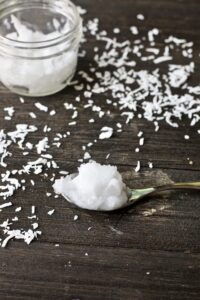
- Furthermore, coconut oil slows down obvious aging symptoms like fine lines and sagging by containing natural antioxidants like vitamin E and polyphenols that fight free radical damage. Coconut oil provides deep replenishment for those with extremely dry or aged skin, leaving it smooth and glowing.
- From an experiential perspective, using coconut oil results in a smooth and soft feeling right away. Coconut oil provides a richness that truly nourishes, in contrast to light gels or creams, particularly in dry conditions or throughout the winter. With regular application, many people experience a reduction in roughness, an evening of skin tone, and a return of their natural radiance.
- Dermatologists frequently emphasize the advantages of coconut oil from a trust standpoint, but they also advise using it sparingly. Due to its comedogenic properties and potential to clog pores, it may not be the best choice for skin that is prone to acne. Using virgin, cold-pressed coconut oil guarantees the highest level of safety and efficacy without the use of additives.
- Best Way to Massage Coconut Oil for Glow
- A little face massage is one of the best ways to apply coconut oil. In addition to improving product absorption, massage increases circulation, which makes skin look more luminous naturally.
- Methodical coconut oil massage technique:
- Select the appropriate oil: For purity, use virgin coconut oil that has been cold-pressed.
- To make the oil a little warmer, massage a few drips between your palms.
- Apply after cleansing: Begin by washing and drying your face.
- Gently massage:
- Apply upward strokes to the jawline and cheeks.
- movements in circles across the forehead.
- Avoid making direct eye contact and gently tap the area surrounding the eyes.
- Massage for five to seven minutes to increase blood flow.
- Finish: If your skin feels excessively oily, use a gentle cloth to remove excess, or leave it on overnight for deep nourishment.
- From the perspective of the experience, this massage is similar to spa therapy at home in that it not only leaves the skin looking radiant but also encourages relaxation. Frequent practice, perhaps two to three times per week, helps preserve a youthful, healthy glow and increase skin elasticity.
- DIY glow masks can also be made with coconut oil. For example, a healthy, energizing pack can be made by combining a teaspoon of coconut oil, honey, and a bit of turmeric. An Ayurvedic practice called abhyanga, which involves rubbing heated coconut oil before taking a shower, deeply conditions the skin, leaving it smooth and glowing afterward.
- Avoiding overuse on skin prone to acne is crucial from a trust and safety standpoint. Before using coconut oil on the face, a patch test is advised. However, coconut oil is a tried-and-true, safe remedy that naturally restores luster to dry, flaky, or aged skin.
FAQS
1. Are home remedies really effective for glowing skin?
Yes, many home remedies like aloe vera, turmeric, honey, and rose water have natural compounds proven to hydrate, brighten, and soothe the skin. While they can’t replace dermatological treatments for major concerns, they work well for daily care and mild skin issues.
2. How long does it take to see results from natural remedies?
Consistency is key. Most remedies show visible results in 2–4 weeks when used regularly, as natural ingredients work gradually by nourishing skin cells and improving texture.
3. Can home remedies replace skincare products?
They can complement but not fully replace professional skincare products. Remedies like aloe vera gel, honey, and cucumber provide instant relief and hydration, but moisturizers, sunscreens, and serums formulated in labs offer tested stability and protection.
4. Is lemon safe to apply directly on the skin?
Pure lemon juice can be too acidic and may cause irritation or photosensitivity. It is safer to mix lemon with soothing ingredients like yogurt or honey before applying to the face, and always rinse before sun exposure.
5. How often can I use turmeric on my skin?
Turmeric can be applied 2–3 times a week. Overuse may cause dryness or yellow stains. Always mix it with milk, honey, or yogurt to balance its potency.
6. Does honey suit all skin types?
Yes, honey is generally safe and works well for dry, oily, and combination skin because it naturally balances moisture. However, those allergic to bee products should avoid it.
7. Can rose water be used daily?
Absolutely. Rose water is gentle, cooling, and balancing. It can be used as a daily toner, face mist, or even in DIY masks to refresh and hydrate the skin.
8. Is coconut oil good for oily or acne-prone skin?
Coconut oil is deeply nourishing but may clog pores in acne-prone skin. It is best suited for dry to normal skin. For oily skin, lighter oils like jojoba or grapeseed are better alternatives.
9. Are these remedies safe for sensitive skin?
Most are safe, but patch testing is recommended. Sensitive skin may react to lemon, turmeric, or certain essential oils. Always start with a small area before full-face application.
10. Do I still need sunscreen if I use natural remedies?
Yes, sunscreen is a must. While remedies like turmeric and cucumber help reduce sun damage, they don’t provide UV protection. Pairing natural care with sunscreen ensures lasting glow and skin health.

